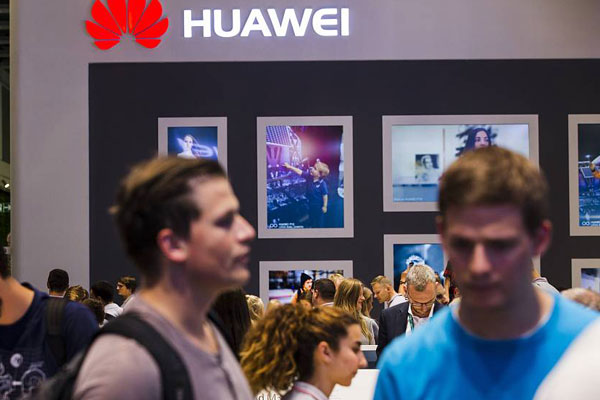Huawei banks on technology to bridge gap with Apple and Samsung


SHANGHAI - Chinese telecommunications and networking firm Huawei is banking on technology to reduce the gap with peers like Apple and Samsung in the highly competitive global smartphone market.
Despite being essentially barred from the critical US market, Huawei surpassed Apple to become the world's number two smartphone maker in the second quarter of this year and has market leader Samsung in its sights.
The company has achieved this in part by shifting its focus away from the US market and instead concentrating on gaining market share in developing nations with its moderately priced but increasingly sophisticated phones, analysts said.
"Huawei's image and brand recognition across markets and regions is getting better and better," said Tarun Pathak of global market analysis firm Counterpoint.
"They have differentiated and positioned their products across price segments, which makes an interesting comparison in terms of competition with Apple and Samsung."
Founded by Ren Zhengfei, now 73, with a few thousand dollars in 1987, Huawei focused initially on the backbone hardware for telecommunications networks, growing to become the world leader.
Fifteen years after introducing its first phone, Huawei surpassed Apple in the April-June quarter to take second place globally, International Data Corporation said last week, the first time since 2010 that Apple does not figure in the top two positions.
Huawei's consumer products chief Richard Yu raised the ante Friday, saying the company could overtake South Korean giant Samsung by late 2019.
"The importance of Huawei overtaking Apple this quarter cannot be overstated," senior analyst Ben Stanton of Canalys wrote in a report on the latest sales data.
"Huawei's exclusion from the US has forced it to work harder in Asia and Europe to achieve its goals."
Based in the southern Chinese tech hub of Shenzhen, Huawei had already been pushing into developing markets even before trade tensions hampered its entry into the US markets.
Rather than ruminate over the missed opportunities, Huawei has built up its business in more price-conscious markets, from Indonesia to Saudi Arabia, South Africa and even Europe.
Analysts note that as those markets mature and customers graduate to higher end phones, they will already be in Huawei's ecosystem.
"If Apple and Samsung want to maintain their market position, they must make their portfolios more competitive," said Canalys's Stanton.
Samsung shipped 71.5 million handsets for a 20.9 percent global market share in the second quarter, compared with Huawei's 54.2 mil-lion phones and 15.8 percent share. Apple sold 41.3 million iPhones for a 12.1 percent share.
Huawei shipped 95 million units in the first half and is targeting 2018 sales of 200 million, a threshold crossed previously only by Samsung and Apple.
The Trump administration had imposed tough penalties on Huawei's peer ZTE for violating US sanctions by selling goods to Iran and the Democratic People's Republic of Korea.
The penalties, since lifted, would have deprived ZTE of US electronics components it desperately needs. Huawei, however, produces its own key components, giving the US less leverage.
But an industry sales slowdown and market saturation could limit its growth.
The IDC report said 342 million smartphones were shipped worldwide during the second quarter of this year, down 1.8 percent year-on-year and the third consecutive decline on a quarterly basis.
In the long term, the lack of a US foothold will be an Achilles heel for Huawei, analysts said, and some market studies project Apple reclaiming the number two spot when new iPhone models are released later this year.
And as Huawei customers graduate to higher end gadgets above $600, the Chinese company will have to compete head-to-head with Apple on quality and features.
"As you move upward, there are fewer competitors but the features, the challenges, the innovation, and the expectations grow," said Counterpoint's Pathak.
"That is something that Huawei, Apple and Samsung all need to capitalize on."
A critical test looms in the next two years, when 5G systems are expected to roll out and manufacturers will be judged on how their smartphones handle the enhanced capabilities.
Huawei is already gearing up for the challenge. Its research and development spending grew 17 percent last year to $13.8 billion, putting the company in the same league as Samsung, Amazon and Google's parent Alphabet, while recent product launches in Europe have been increasingly glitzy.
"Things like camera capabilities and how Huawei rises overall to that (5G) challenge will decide if it is among the Apples and Samsungs, but I think they belong," Pathak said.
Agence France-Presse




































